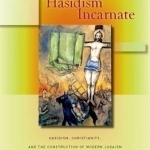Hasidism Incarnate: Hasidism, Christianity, and the Construction of Modern Judaism
BookThis item doesn’t have any media yet
2014 | Philosophy, Psychology & Social Sciences
Hasidism Incarnate contends that much of modern Judaism in the West developed in reaction to Christianity and in defense of Judaism as a unique tradition. Ironically enough, this occurred even as modern Judaism increasingly dovetailed with Christianity with regard to its ethos, aesthetics, and attitude toward ritual and faith. Shaul Magid argues that the Hasidic movement in Eastern Europe constitutes an alternative "modernity," one that opens a new window on Jewish theological history. Unlike Judaism in German lands, Hasidism did not develop under a "Christian gaze" and had no need to be apologetic of its positions. Unburdened by an apologetic agenda (at least toward Christianity), it offered a particular reading of medieval Jewish Kabbalah filtered through a focus on the charismatic leader that resulted in a religious worldview that has much in common with Christianity. It is not that Hasidic masters knew about Christianity; rather, the basic tenets of Christianity remained present, albeit often in veiled form, in much kabbalistic teaching that Hasidism took up in its portrayal of the charismatic figure of the zaddik, whom it often described in supernatural terms.
Related Items:
| Published by | Stanford University Press |
| Edition | Unknown |
| ISBN | 9780804791304 |
| Language | N/A |
Images And Data Courtesy Of: Stanford University Press.
This content (including text, images, videos and other media) is published and used in accordance
with Fair Use.
